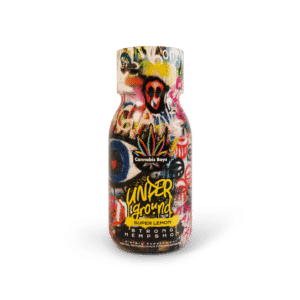Medical marijuana and CBD vs. insomnia: Does cannabis help treat sleep disorders?
Medical marijuana, rich in cannabinoids such as THC (tetrahydrocannabinol) and CBD (cannabidiol), has been attracting attention for years as a potential treatment for a variety of ailments. One of its less obvious but extremely important areas of use is in the treatment of sleep disorders, including insomnia - a problem that affects millions of people around the world. In this article, we'll take a look at how medical cannabis can help with insomnia and how it differs from traditional treatments.
Sleep as the foundation of health and well-being
Sleep is an essential element of our functioning, which is crucial for maintaining physical and mental health. During sleep, the body regenerates, processes information and emotions, and strengthens the immune system. Unfortunately, the global epidemic of insomnia is beginning to pose a serious public health challenge.
The importance of sleep for physical health
- Tissue regeneration and repair: During sleep, the body intensively regenerates cells, heals wounds and muscle damage, and strengthens the immune system, which is essential for fighting infections.
- Metabolism: Sleep affects glucose metabolism and metabolic processes, which is important in the prevention of diseases such as obesity and type 2 diabetes.
- Nervous system: During sleep, the brain consolidates memories and learns new information, which is essential for proper cognitive functioning.
- Hormones: Sleep regulates the secretion of hormones such as melatonin, which affects the body's diurnal rhythm, and growth hormones, which play an important role in recovery and development.
The importance of sleep for mental health
- Regulation of emotions: Sleep helps regulate emotions, reduces stress and anxiety, and supports the ability to cope with difficult situations.
- Cognitive functioning: A sleepy brain concentrates better, solves problems and remembers information, which is crucial in daily professional and personal life.
- Self-image: Sleep affects overall well-being and emotional well-being, and a lack of it can lead to lower mood, irritability and memory problems.
Epidemiology of insomnia
- The global scale of the problem: Insomnia is one of the most common sleep disorders in the world, affecting between 30TP3T and 50% of the population. In Poland, the problem is estimated to affect up to 20-30% adults.
- Risk factors: Major risk factors include stress, poor diet, excessive use of electronic devices before bedtime, and lack of regular physical activity.
- Health effects: Insomnia can lead to the development of many diseases, such as high blood pressure, heart disease, obesity, type 2 diabetes and depression.
- Treatment and support: Treatment of insomnia is based on lifestyle changes, behavioral therapies, pharmacotherapy and in some cases psychotherapy. It is also important to educate the public about the importance of sleep for health and well-being.
An investment in sleep is an investment in health
Sleep is not a luxury, but a basic need of the body. Knowing its importance for physical and mental health and understanding the epidemiology of insomnia are key to taking informed action to improve sleep quality. Modern society, with its fast pace of life and increasing levels of stress, must prioritize healthy sleep as the foundation for the well-being of each individual and society as a whole.
Cannabis as allies in the fight against insomnia - mechanisms of action on sleep
Hemp has accompanied mankind for millennia, offering a variety of health benefits. One of the less obvious but extremely important properties of cannabis is its effects on sleep and the regulation of sleep-wake cycles. The endocannabinoid system (ECS) plays a key role here, and substances such as THC and CBD have the ability to modulate this system in ways that can be both therapeutic and dangerous. In this article, we will take a closer look at the mechanisms of cannabis' effects on sleep, with a particular focus on its interaction with the endocannabinoid system and other body systems.
Endocannabinoid system and its role in sleep regulation
- ECS Basics
The endocannabinoid system is a network of receptors, enzymes and neurotransmitters spread throughout the body. Its main function is to maintain homeostasis by regulating many physiological processes, including sleep. Endocannabinoids - natural substances similar to THC and CBD - are produced by the body and bind to ECS receptors, affecting a variety of functions, including sleep-wake cycles. - Mechanisms of action of ECS on sleep
When the endocannabinoid system is activated by cannabis, there is an interaction with CB1 and CB2 receptors. These receptors are located in various parts of the brain, including areas such as the hypothalamus and amygdala, which play a key role in sleep regulation. Activation of these receptors can lead to changes in wakefulness levels, affecting the depth of sleep and its quality. - Importance of ECS for sleep health
Maintaining proper activity of the endocannabinoid system is essential for a healthy sleep-wake cycle. Dysfunction of the ECS can lead to sleep problems such as insomnia and restless legs syndrome. In turn, stimulation of this system by cannabis can provide relief from these conditions, improving the quality and length of sleep.
Effects of THC and CBD on sleep cycles
- THC - a sleep activator?
Tetrahydrocannabinol (THC) is the main psychoactive component of cannabis. Its effects on sleep are complex. THC can act as a CB1 receptor agonist, which theoretically promotes sleep and deep REM (Rapid Eye Movement) sleep. However, long-term use of THC can lead to disruptions in the sleep cycle, such as reduced REM phase duration and increased sleep fragmentation. - CBD - ECS modulator
Cannabidiol (CBD) has no psychoactive effects and acts as a CB1 receptor antagonist and a reuptake inhibitor of anandamide, a natural endocannabinoid. Unlike THC, CBD can help improve sleep quality, reducing stress and anxiety without producing psychoactive effects. Studies suggest that CBD may help treat insomnia and other sleep disorders by acting as a natural sedative.
Interactions with other systems: Nervous and endocrine systems
- Nervous system
Cannabis affects the nervous system by modulating neurotransmission in the central nervous system, which can have a direct effect on sleep regulation. THC stimulates the release of dopamine and serotonin, which play a role in sleep-related processes. CBD, on the other hand, can have anti-inflammatory and anxiolytic effects, which is particularly important for those suffering from insomnia caused by stress or anxiety. - Endocrine system
Cannabis' interactions with the endocrine system are also important for sleep regulation. Cannabis can affect levels of melatonin, the hormone that controls the diurnal cycle and regulates sleep. THC can inhibit the production of melatonin, which is one reason why it is difficult to fall asleep after consuming it. CBD, on the other hand, can restore hormonal balance and support natural sleep regulation processes.
Cannabis as a tool in the fight against insomnia
Cannabis, with its unique effects on the endocannabinoid system and other body systems, can be an effective tool in the fight against insomnia and other sleep disorders. THC can be helpful in acute situations, but its psychoactive effects and potential side effects limit its usefulness in long-term therapy. CBD, on the other hand, due to its beneficial properties without psychoactive effects, appears to be a promising treatment for sleep disorders. However, it is worth remembering that each case is individual and the choice of the appropriate form of therapy should be tailored to the patient's needs and condition under the supervision of a doctor.
Introduction: cannabis as a new hope in the fight against insomnia - a review of scientific research
Insomnia is a common health problem that affects millions of people worldwide. Traditional treatments such as sleep medications and cognitive-behavioral therapy (CBT), while effective, are often associated with risks of addiction, side effects and limited long-term effectiveness. In recent years, the potential use of cannabis (Cannabis sativa) as an alternative or complementary therapy for insomniacs has received increasing attention. In this article, we provide an overview of scientific studies on the efficacy of cannabis for treating insomnia and how it compares with traditional methods.
Mechanism of action of cannabis on sleep
Hemp contains more than 100 different cannabinoids, the best known of which are tetrahydrocannabinol (THC) and cannabidiol (CBD). Both of these compounds affect the endocannabinoid system (ECS), the body's regulatory system responsible for a wide range of functions, including sleep and mood. THC acts as an agonist at CB1 and CB2 cannabinoid receptors, which can lead to psychoactive effects and affect sleep cycles by modulating neuronal activity in the brain. CBD, on the other hand, acts as an antagonist of these receptors or as an inhibitor of enzymes that break down endocannabinoids, which can lead to improved sleep quality without causing psychoactive effects.
Overview of clinical and experimental studies
Research on the effectiveness of cannabis in treating insomnia is still relatively scarce, but the results are promising. In one randomized double-blind clinical trial, patients with insomnia were given a drug containing THC and CBD, which proved effective in improving falling asleep time and sleep quality. In another comparative study, the use of CBD preparations for 6 weeks was shown to significantly reduce the severity of insomnia in patients compared to placebo.
Comparison with traditional treatments for insomnia
Traditional sleep medications, such as benzodiazepines and nonbenzodiazepine sleep medications (Z-drugs), are often used to treat insomnia. Although they are effective for short-term symptom relief, their long-term use can lead to tolerance, dependence and deterioration of sleep quality. Compared to these drugs, studies show potential benefits of cannabis THC and CBD, such as lower risk of addiction, lack of tolerance and better tolerance.
Challenges and limitations of research
Despite promising results, research into the efficacy of cannabis in treating insomnia faces some challenges. Many are small clinical trials limited to specific patient populations, making it difficult to generalize the results to a broader population. In addition, there are concerns about the safety and efficacy of various cannabis preparations due to the lack of standardization of formulation and dosage.
Conclusions and future research directions
In conclusion, research suggests that cannabis may be a promising alternative or complement to traditional treatments for insomnia. However, further well-designed clinical trials with larger trials and standardization of hemp preparations are needed to definitively establish their efficacy and safety. In the meantime, physicians may want to consider the use of cannabis in the form of THC and CBD as part of an integrated approach to insomnia treatment, especially in patients who do not respond to traditional methods or prefer natural forms of therapy.
Insomnia is a serious health problem that affects many people around the world. While traditional treatments are effective for short-term symptom management, cannabis can provide an alternative or complementary therapy for those seeking more natural solutions or who cannot tolerate traditional medications. As scientific research into the efficacy of cannabis in treating insomnia progresses, we can expect further discoveries and potentially new treatment options for those struggling with sleep difficulties.
The use of cannabis in the treatment of insomnia
Depending on the individual patient's needs, the doctor may recommend different forms of cannabis preparations - oils, capsules, dried for smoking or vaporization. Dosage is key and should be tailored to the severity of symptoms and the body's tolerance. For insomnia, CBD is often recommended before bed to promote relaxation and reduce anxiety, while THC can be used to induce fast and deep sleep.
Safety and side effects of hemp therapy
As with any form of treatment, the use of medical cannabis may involve some risks. Possible side effects include dizziness, dry mouth or decreased appetite. It is important to consult a doctor before starting therapy to assess potential interactions with other medications you are taking and your overall health.
The Use of Cannabis in Insomnia Therapy: Recommendations and Dosages
Introduction to cannabis as a natural remedy for insomnia
Insomnia is a common sleep disorder that affects millions of people around the world. It can significantly affect daily functioning, productivity and overall quality of life. Traditional treatments for insomnia, such as sleep medications and relaxation techniques, often carry the risk of addiction or side effects. In recent years, there has been growing interest in alternative therapies, including the use of cannabis to relieve insomnia symptoms.
Hemp as a natural remedy for insomnia
Cannabis sativa (cannabis) contains a number of active ingredients, including two major ones: tetrahydrocannabinol (THC) and cannabidiol (CBD). Both of these compounds show potential in treating insomnia by interacting with the endocannabinoid system, which plays a key role in regulating sleep and mood.
Active ingredients of hemp: THC and CBD.
THC (Tetrahydrocannabinol).
THC is the main psychoactive ingredient in cannabis, which can affect sleep through agonistic effects on CB1 cannabinoid receptors. In clinical trials, THC has shown efficacy in treating insomnia in people with chronic pain conditions, as well as in patients with narcolepsy and post-traumatic stress disorder (PTSD). However, THC dosing should be cautious due to its addictive potential and its ability to cause hallucinations and disorientation.
CBD (Cannabidiol).
CBD is a non-psychoactive component of cannabis that exhibits a wide range of medicinal properties, including sedative and anti-anxiety effects. As a CB1 receptor antagonist, CBD may help improve sleep quality without producing the psychoactive effects characteristic of THC. Studies suggest that CBD may be effective in alleviating symptoms of insomnia in the elderly and those with anxiety disorders.
Forms of cannabis preparations for treating insomnia
There are many forms of cannabis preparations available on the market, each with its own unique properties and potential uses in the treatment of insomnia:
Hemp oil (CBD oil)
- Hemp oil is a popular form of CBD extraction often used to treat insomnia. It is an oily liquid that can be taken orally by placing drops under the tongue or added to meals.
- Advantages: easy dosage and absorption, fast action.
- Disadvantages: potential bitter taste, limited bioavailability.
Hemp capsules
- CBD capsules are a convenient way to take hemp supplements. They are easy to dose and do not have the bitter taste that can be present in oil.
- Advantages: convenience of use, no bitter taste.
- Disadvantages: may be less effective than oil due to lower CBD concentration.
Dried hemp
- Dried hemp, often sold as tea or smoking blends, is a popular form of THC and CBD consumption.
- Advantages: fast action, possibility of synergistic effects of various cannabis components (so-called entourage effect).
- Disadvantages: risk of THC addiction, potential negative health effects associated with smoking.
Hemp ointments and creams
- Ointments and creams containing CBD or other hemp ingredients can be applied topically to relieve pain and help you fall asleep.
- Advantages: direct action on the site of pain, no psychoactive effects.
- Disadvantages: limited bioavailability, possibility of allergic reactions.
Recommendations for the use of THC and CBD for sleep
Taking cannabis to treat insomnia should always be consulted with a doctor, especially when it comes to THC because of its potential side effects. Here are some general recommendations:
THC
- Dosage should be individually tailored to the patient's needs, starting with low doses and gradually increasing them as needed.
- THC can exacerbate the effects of tranquilizers and anti-anxiety medications, so simultaneous use of these substances should be avoided.
- Be aware of the possible effects of THC on the ability to drive and operate machinery.
CBD
- As with THC, CBD dosage should be individual, starting with small doses and gradually increasing them.
- CBD is generally well tolerated and has no psychoactive effects, but it can affect the effects of other drugs, so consult your doctor before combining them.
- CBD is safe for driving and operating machinery.
Cannabis offers a wide range of treatment options for insomnia, thanks to both THC and CBD. Choosing the right formulation and customizing the dosage are key to effective treatment. Always consult your doctor before starting to use cannabis for medical purposes to assess the potential benefits and risks.
Comparison of Medical Cannabis to Other Insomnia Treatment Methods: Advantages, Disadvantages and Criteria for Choosing the Most Appropriate Form of Treatment.
Insomnia is a common sleep disorder that affects millions of people around the world. Treatment for this condition includes a variety of methods, from lifestyle changes to pharmacotherapy and natural remedies such as medical cannabis. In this article, we will compare medical cannabis with other popular treatments for insomnia, analyzing their advantages and disadvantages and providing criteria for choosing the most appropriate form of treatment for a patient.
Benefits of Medical Cannabis in Insomnia Therapy
Effects on the endocannabinoid system: Medical cannabis containing both THC (tetrahydrocannabinol) and CBD (cannabidiol) interact with the endocannabinoid system, which regulates many bodily functions, including sleep. THC has a calming effect, while CBD exhibits anti-anxiety and anti-inflammatory properties, which can promote better sleep.
Natural remedy: Medical cannabis is a natural plant product, making it an attractive option for those seeking alternative therapy. Their effectiveness and safety have been the subject of many scientific studies.
Versatility: Medical cannabis is available in a variety of forms, such as oils, capsules, dried for smoking or even topical creams and ointments. This allows flexibility in choosing the method of ingestion and adapting it to individual patient preferences.
Disadvantages of Medical Cannabis in Insomnia Therapy.
Interactions with other drugs: Medical cannabis can affect the effects of other medications being taken, which should be taken into account during combination treatment. THC is a known inhibitor of the CYP3A4 isoenzyme, which metabolizes many other drugs, including some antidepressants and statins.
Side effects: Although medical cannabis is considered generally safe, it can cause side effects such as dry mouth, short-term memory impairment or daytime sleepiness. Some patients may also experience anxiety or paranoia after consuming THC.
Availability and regulation: The availability of medical cannabis may be limited in some countries, and differences in laws may hinder its use.
Other Insomnia Therapy Methods and Their Advantages and Disadvantages
Sleeping drugs (benzodiazepines):
- Advantages: fast acting, effective for short-term treatment of insomnia.
- Cons: Risk of mental and physical addiction, tolerance, side effects such as daytime sleepiness.
Antidepressants:
- Pros: Effective in treating insomnia in patients with depression or anxiety; less risk of addiction than with benzodiazepines.
- Cons: Possible side effects such as dry mouth, dizziness, sexual dysfunction; long-term use may cause rebound insomnia.
Behavioral techniques:
- Pros: Effective in changing sleeping habits and improving sleep quality; can be used long-term without risk of addiction.
- Cons: Requires patient involvement; some techniques may not be effective for all patients.
Light therapy and sleep hygiene:
- Advantages: safe, non-invasive methods; no side effects; can be used in conjunction with other therapies.
- Cons: Efficacy dependent on individual patient characteristics, such as diurnal rhythm; may not be effective in people with severe sleep disorders.
Criteria for Selecting the Most Appropriate Form of Therapy for the Patient
Choosing the best treatment for insomnia depends on many factors:
- Medical history: Antidepressants may be preferred in patients with comorbid mood or anxiety disorders.
- Side effects and risk of addiction: Medical cannabis and behavioral techniques are often preferred for patients who want to avoid the risk of addiction.
- Patient's living situation and preferences: Sleep medications may be the drug of choice for patients who require quick action, while light therapy may be attractive for those working shifts.
- Availability and costs: The availability and cost of drugs and behavioral therapies also affect the choice of treatment method.
Choosing the best treatment for insomnia requires an individualized approach, taking into account the patient's medical history, side effects, risk of addiction, preferences and living situation. Medical cannabis can be an effective alternative to traditional sleep medications, but its use comes with some challenges, such as interactions with other medications and limited availability. Collaboration with a medical professional is key to finding the optimal treatment to improve the patient's quality of sleep and life.
Benefits of Using Medical Cannabis to Fight Insomnia: Why is this Treatment Method Worth Considering?
Insomnia is one of the most common health problems suffered by a significant portion of the population. Traditional treatments for this condition include a variety of approaches, from lifestyle changes to pharmacotherapy. There is growing interest in medical cannabis, which may offer effective solutions for those struggling with insomnia. In this article, we'll take a look at the benefits of using medical cannabis to combat insomnia and explain why this treatment method is worth considering.
Natural Mechanisms for Treating Insomnia
Medical cannabis contains a number of active compounds that can affect sleep quality and treat insomnia. The best known are cannabinoids such as THC (tetrahydrocannabinol) and CBD (cannabidiol). THC has a calming effect, which can help with sleep, while CBD, while not having psychoactive effects, also shows potential benefits in treating insomnia by reducing stress and anxiety.
Safety and Tolerance
Unlike traditional sleep aids, medical cannabis is often seen as a safer alternative due to its natural origins. The risk of addiction to cannabis is much lower than that of benzodiazepine drugs, which are often used to treat insomnia. In addition, medical cannabis users report higher tolerance to the drug's effects and fewer side effects than those taking traditional sleep medications.
A Holistic Approach to Health
Medical cannabis offers a holistic approach to health, meaning that it affects the body in a more complex way than single medications. They can help not only improve the quality of sleep, but also relieve pain, reduce stress and anxiety, which is often associated with insomnia. In this way, medical cannabis can be effective in treating the underlying cause of the problem, not just the symptoms.
Individualization of Treatment
Everyone's body is different and responds to medicines in different ways. Medical cannabis offers the possibility of customizing treatment to the individual patient's needs through precise dosing and choosing the right products containing different proportions of THC and CBD. This makes it possible to achieve optimal therapeutic results while minimizing side effects.
Support for Other Treatment Methods
Medical cannabis can be used in combination with other treatments for insomnia, such as behavioral sleep therapy, lifestyle changes or relaxation techniques. In this way, a synergistic effect can be achieved that increases the effectiveness of the treatment and improves the patient's overall sleep quality.
Medical Cannabis as an Effective Treatment for Insomnia
Medical cannabis offers a range of benefits in the fight against insomnia, which can be an attractive alternative to traditional treatments. Their natural effects, safety of use, holistic approach to health, and ability to individualize therapy make them a promising tool for treating this common problem. However, it is worth remembering that the decision to start using medical cannabis should be preceded by a consultation with a qualified doctor or medical cannabis specialist, who will help determine the best treatment plan tailored to the patient's individual needs.
FAQ: Medical Marijuana and CBD, and Insomnia: Does Cannabis Help Treat Sleep Disorders?
What is medical cannabis and how does it work?
How do THC and CBD work on sleep?
THC is a psychoactive component of marijuana that can exert sedative and sleep-inducing effects, making it potentially beneficial in treating insomnia. CBD is non-psychoactive, but also exhibits anti-anxiety and relaxation properties that can help relieve stress and tension, positively affecting sleep quality.
Is medical cannabis safe to use to treat insomnia?
Like any other drug, medical marijuana can cause side effects. In the case of sleep disorders, the most commonly reported are daytime drowsiness, dizziness, dry mouth and restlessness. In addition, people with a predisposition to addiction may be at risk of developing a tolerance or even addiction to THC.
Is CBD safe for sleep?
While there is insufficient evidence that CBD directly affects sleep, most studies suggest that its anti-anxiety effects may help reduce anxiety and tension, which is beneficial for those struggling with insomnia.
What are the methods of using medical marijuana for sleep?
There are several ways to take medical marijuana, such as smoking, vaporization, eating (e.g. cakes with CBD) or even inhalation. The choice of method depends on individual preference and the body's reaction to the drug.
Are there products that contain both THC and CBD?
Yes, there are formulations on the market that combine the action of both ingredients in what is known as an "entourage effect," which can increase therapeutic benefits and reduce the risk of side effects.
What are the legal regulations for medical marijuana in Poland?
In Poland, medical marijuana is available by prescription, and its prescription and use is strictly regulated. To start treatment with medical cannabis, the patient must consult a specialist, who can decide on the appropriate dose and form of therapy.
Where can medical marijuana be purchased in Poland?
Medical marijuana is only available by prescription from pharmacies that have obtained special permits. Patients should consult a doctor to learn about purchasing options and available preparations.
Medical cannabis, especially THC and CBD, may hold promise for treating insomnia and other sleep disorders. However, before starting cannabis therapy, it is important to carefully consult with a medical professional to assess the potential benefits and risks of side effects. An individualized approach to treatment and close cooperation with a medical professional are key to achieving optimal therapeutic results.








